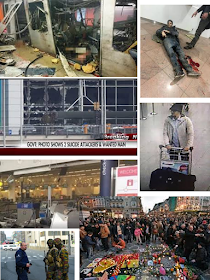While Thailand moved from civilian to military
government, Myanmar moved from military (for more than half century) to civilian
government. Congrats Myanmar people.
A friend suggested that Myanmar will be back to military dictatorship in 6 months and noted that Su Kyi refuses to acknowledge the persecuted Rohingya crisis.
A friend suggested that Myanmar will be back to military dictatorship in 6 months and noted that Su Kyi refuses to acknowledge the persecuted Rohingya crisis.
Being a "rational optimist", I believe that if
ever Myanmar will go back to a military dictatorship, it will be a 2 steps
forward, 1 step backward, and hence, the civilian government -- with all its
warts and imperfections -- will prevail. Meanwhile, it is true that Su Kyi is silent on the Rohingya issue. Now that her buddy is in power, let us see how they will deal with this issue.
There should be some credit to the ASEAN efforts
at promoting human rights. Myanmar's generals and dictators dislike human
rights protection. But being with the ASEAN for many years and seeing other
countries in the region that are under civilian leadership and things are
fine, no frequent riots or demonstrations when there is civilian supremacy over
the military, the military softened and allowed elections and they were defeated.
Compare the state of human rights respect or
violation, South East Asia vs South Asia or Middle East or Africa or S.
America, SE Asia is better. Here in the PH for instance, things are not exactly
heavenly but freedom of speech is more protected, almost anyone can curse the
President or legislators or the Supreme Court, etc. without going to jail.
There are still remnants of the military dictatorship, but there are changes. From nearly 100% to 25% military presence in the Parliament, that is still an improvement.
There are still remnants of the military dictatorship, but there are changes. From nearly 100% to 25% military presence in the Parliament, that is still an improvement.
"A key challenge for Suu Kyi's administration will
be maintaining smooth relations with a military that locked her and many of her
colleagues up for years.
The charter ring fences a quarter of parliamentary seats
to unelected soldiers and gives the army chief control over the home affairs,
border and defense ministries -- and with it sweeping powers over the civil
service." http://interaksyon.com/.../suu-kyi-aide-htin-kyaw-sworn...
A good and brief timeline. The military dictatorship was in power from 1962-2015, 53 years. http://interaksyon.com/.../new-dawn-for-myanmar--timeline...
Meanwhile, here's one proof of economic liberalization in Myanmar, coinciding with political liberalization that allowed elections. Myanmar made the biggest reduction in total tax rate among the 10 ASEAN countries, from the PWC "Paying Taxes 2016" report, in just one year. There is momentum in economic and political liberalization in that country.
From my article in BusinessWorld today.
Finally, I believe that the Thai military dictatorship won't last long. They should be gone from power within two years or less.
---------See also:
On Myanmar, Letter to Sec. Romulo, October 05, 2007
Migration 24: Rohingya Boat People to SE Asia, May 12, 2015



























